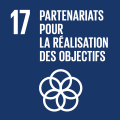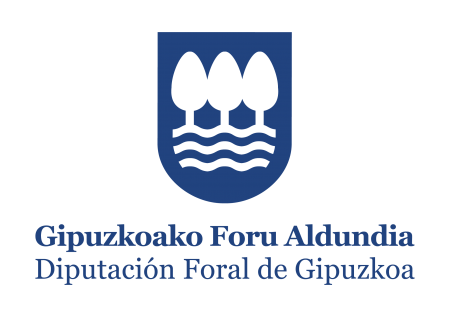
CURSO ONLINE EN DIRECTO - La Agenda 2030 y su reflejo en las políticas de cooperación descentralizada. El caso de Gipuzkoa Coopera de la Diputación Foral de Gipuzkoa
Description
Para participar en el Curso de Verano puedes matricularte gratuitamente a través del botón de matrícula online o también puedes seguirlo vía streaming a través de nuestro canal de youtube. https://www.youtube.com/watch?v=G3a66f5BIVI
El Curso de Verano analizará las implicaciones que la nueva Agenda Internacional 2030 de los Objetivos de Desarrollo Sostenible (ODS) tiene sobre las políticas de desarrollo por parte de la cooperación descentralizada, su capacidad transformadora, sus luces y sus sombras. En este sentido, se abordarán las iniciativas puestas en marcha por el conjunto de la Diputación Foral de Gipuzkoa para implementar los ODS, y su repercusión en las políticas de Cooperación Internacional, en particular a través de la coherencia de políticas y del programa de Gipuzkoa Coopera por el cual, se trata de ampliar el abanico de actores implicados con la cooperación internacional.
Objectives
Determinar el alcance de la Agenda 2030 en las políticas de cooperación al desarrollo. ¿Cambio de paradigma? ¿es un instrumento válido de transformación social y lucha contra las desigualdades a nivel global?
Explicar las reflexiones y acciones puestas en marcha por la Diputación Foral de Gipuzkoa en relación con la implementación de la Agenda 2030 y sus efectos en su planificación interna.
Analizar las iniciativas puestas en marcha por la Diputación Foral de Gipuzkoa en relación con el cumplimiento de los ODS en el ámbito de la cooperación internacional; el enfoque que se está llevando a cabo sobre la coherencia de políticas y la corresponsabilidad y, en particular, los resultados del programa de Gipuzkoa Coopera.
Activity directed to
- All public
Contributors
Program
22-06-2020
“Saludo inicial “
- Harkaitz Millan Etxezarreta Diputación Foral de Gipuzkoa - Diputado de Cultura, Cooperación, Juventud y Deportes
- Itziar Alkorta Idiakez Cursos de Verano UPV/EHU - Directora
“Agenda 2030. Su impacto en las políticas de cooperación descentralizada“
- José Ángel Sotillo Lorenzo Universidad Complutense de Madrid - Director del Instituto Universitario de Desarrollo y Cooperación
“Implementación de la Agenda 2030 en la Diputación Foral de Gipuzkoa“
- Sebastian Zurutuza Mujika Diputación Foral de Gipuzkoa - Director de Estrategia de Gestión
Break
“El programa Gipuzkoa Coopera. Implicación de agentes no tradicionales en el ámbito de la cooperación internacional dentro del paradigma de los ODS“
- Mikel Díez Sarasola Diputación Foral de Gipuzkoa - Director de Cooperación Internacional
Round table: “Mesa redonda. ODS y Cooperación. Participantes ONGDs, miembros de la universidad, representantes de otras entidades“
- Mikel Díez Sarasola Diputación Foral de Gipuzkoa - Director de Cooperación Internacional
- Estíbaliz Sáez de Cámara Oleaga UPV/EHU - Directora de Sostenibilidad
- Irene Molero Gurrutxaga Coordinadora de ONGs de Euskadi
- Noé Cornago Prieto EHU/UPV - profesor de relaciones internacionales y director del Instituto de Sociología Jurídica de Oñati
- José Ángel Sotillo Lorenzo Universidad Complutense de Madrid - Director del Instituto Universitario de Desarrollo y Cooperación
Directors
Professor of Constitutionalism and Globalization EHU/UPV Director of International Cooperation of the Provincial Council of Gipuzkoa. Professor of International Law at the University of Deusto. D. in Law and International Relations from the EHU under the direction of Noe Cornago and co-direction of Talha Syed. The global regime of Intellectual Property. LLM University of California, Berkeley. Fulbright Scholarship 2003-2004. Law Degree EHU
Speakers
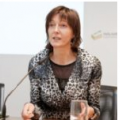
Itziar Alkorta Idiakez
Uda Ikastaroak / Cursos de Verano, Zuzendari akademikoa / Directora académica
She holds a PhD in Law and is a lecturer in Civil Law at the UPV/EHU. Her main line of research is bioethics, a subject on which she has published several monographs and scientific and dissemination articles. She has participated in 4 European research projects of the VI and VII European Framework Programme, as well as in multiple research projects of the National Programme. She has been a visiting professor at the Hastings Center for Bioethics in New York, the Center for Bioethics at the University of Philadelphia and the University of Bordeaux. She was Secretary General of Eusko Ikaskuntza, and later of Jakiunde, Academy of Sciences, Arts and Letters. Vice-rector of quality and teaching innovation at the UPV/EHU between 2008 and 2012, and responsible for the development of the educational model, as well as quality programmes, and training and evaluation of university teaching staff. Between 2013 and 2015, she was Deputy Minister of Universities and Research of the Basque Government.

Noé Cornago Prieto
Associate Professor of International Relations at the University of the Basque Country in Bilbao (Spain), and former Scientific Director of the Oñati International Institute for the Sociology of Law (2018-2020). His research interests are focused on the contemporary transformations of diplomacy, global regulation, critical sociology of knowledge, post-development, and aesthetics and politics. He has held diverse short visiting positions at Ohio State University and University of Idaho, Université Laval, Sciences Po Bordeaux France, and was the Basque Visiting Fellow at St. Antony's College, University of Oxford (2011-2012). More recently he has been Invited Professor at Sciences Po Paris (Spring 2017). He is the author of Plural Diplomacies: Normative Predicaments and Functional Imperatives (Brill, 2013), and co-authored with Fional McConnell and Costas M. Constantinou Transprofessional Diplomacy (Brill 2017).
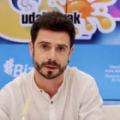
Harkaitz Millan Etxezarreta
Donostiako Udala

Irene Molero Gurrutxaga
Euskadiko GGKEen Koordinakundea

Estíbaliz Sáez de Cámara Oleaga
Universidad del Pais Vasco/Euskal Herriko Unibertsitatea (UPV/EHU)
PhD in Environmental Engineering and professor in the ‘Environmental Technologies’ area in the Department of Chemical Engineering of the Environment at the School of Engineering in Bilbao. Since 2017 she is the Director of Sustainability and Social Commitment at the UPV / EHU. She is in charge of promoting and planning, along with the Vice-Rectorrate of Scientific and Social Development and Knowledge Transfer. She is a member of the Academic Committee of the Master Circular Economy: Business Aplication. Furthermore, she is the vicepresident of the Spanish Network for Sustainable Development (REDS).
José Ángel Sotillo Lorenzo
Profesor de Relaciones Internacionales, en el Departamento de "Relaciones internacionales e historia global" de la Facultad de Ciencias Políticas y Sociología (Universidad Complutense de Madrid). Director del Instituto Universitario de Desarrollo y Cooperación (IUDC) Director del Máster en Cooperación Internacional (UCM) Director de la Revista Española de Desarrollo y Cooperación Publicaciones: América Latina en construcción (2006), Las transformaciones de América Latina (2017), El sistema de cooperación para el desarrollo. Actores, formas y procesos (2011), Antología del desarrollo (2015), El ecosistema de la cooperación. La Agenda 2030 para el desarrollo sostenible (2017) Premio Manuel Castillo 2018 (Universitat de València)
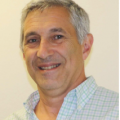
Sebastian Zurutuza Mujika
Gipuzkoako Foru Aldundia/Diputación Foral de Guipúzcoa
Cargo: Director general de Estrategia de Gestión. Estudios: Licenciado en Ciencias Económicas y Empresariales (Especialista Universitario en Administración Pública de la EHU/UPV). Idiomas: euskera (alto); castellano (alto); inglés (medio). Trayectoria profesional y política: - Jefe de Servicio de Compromisos Institucionales. Diputación Foral de Gipuzkoa (1993-2015). - Jefe de Sección de Cupo y Aportaciones Financieras. Diputación Foral de Gipuzkoa (1992-1993). - Profesor Asociado. EHU-UPV (Facultad de Derecho) (1988-1994). - Economista. Diputación Foral de Gipuzkoa (1987-1992). - Profesor. Formación Profesional (Elgoibar y Usurbil) (1982-1987).
Registration fees
| REGISTRATION | Until 22-06-2020 |
|---|---|
| 0 EUR |
Venue
Online streaming
Live online
Sustainable development goals
Agenda 2030 is the new international development agenda approved in September 2015 by the United Nations. This agenda aims to be an instrument to favour sustainable human development all over the planet, and its main pillars are the eradication of poverty, a reduction in equality and vulnerability and fostering sustainability. It is a unique opportunity to transform the world up to 2030 and guarantee human rights for all.

11 - Sustainable cities and communities
Make cities and other human settlements inclusive, safe, resilient and sustainable. Key issues: access to suitable housing and basic services that are secure and affordable, suitable and sustainable transport systems, inclusive urban planning, participative planning and management, protection of cultural and natural heritage, air-quality, green zones, and connections between urban, peri-urban and rural areas.
More information
12 - Responsible consumption and production
Guarantee sustainable modalities of consumption and production. Key issues: sustainable management and efficient use of natural resources, reduction of chemical particles released to the atmosphere, water and soils, reduction of waste products, recycling, reuse and reduction, sustainable practices, sustainable public procurement, sustainable lifestyles, rationalisation of inefficient subsidies for fossil fuels.
More information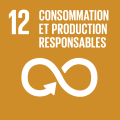
16 - Peace, justice and strong institutions
Foster peaceful and inclusive societies for sustainable development, facilitate access to justice for everyone and construct efficient and inclusive institutions that are accountable at all levels. Key issues: a reduction in violence, mistreatment and exploitation, the rule of law, equal access to justice, a reduction in corruption and bribery, efficient and transparent institutions, participation, access to information, protection of fundamental freedoms.
More information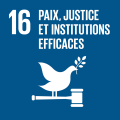
17 - Partnerships for the goals
Strengthen the means of implementation and revitalise the World Alliance for Sustainable Development. Key issues: mobilisation of resources, 0.7% of GDP for official overseas development aid, finances, cooperation in technology and innovation, ecologically rational technologies, skills building, universal and multilateral trade system, coherence on the legislative and institutional levels, availability of data, supervision, indicators and accountability.
More information